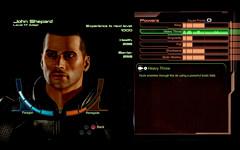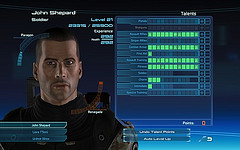This post has not been edited by the GamesBeat staff. Opinions by GamesBeat community writers do not necessarily reflect those of the staff.
 As any of the breathlessly gushing reviews of Mass Effect 2 that have been posted on the internet in the past few weeks will tell you – or, for that matter, Bitmob's own Cody Winn – BioWare implemented some radical changes in its newest sequel that distance it not only from its predecessor, but from the RPG genre as a whole.
As any of the breathlessly gushing reviews of Mass Effect 2 that have been posted on the internet in the past few weeks will tell you – or, for that matter, Bitmob's own Cody Winn – BioWare implemented some radical changes in its newest sequel that distance it not only from its predecessor, but from the RPG genre as a whole.
You don't gain experience points for killing individual enemies or performing specific tasks; Commander Shepard has no attributes that determine his or her base stats; whether or not you hit an enemy with a shot fired depends entirely upon your aiming skill and the characteristics of the weapon you're using, instead of some unfathomable series of stat calculations; and the leveling system itself has been drastically simplified.
I'm not here to review the entire game – the vast improvements made to the graphics, music, story mechanics, and production values as a whole stand on their own merits. The key question I'm trying to answer here is "Does Mass Effect 2 work as an RPG?"
Did BioWare sell out the genre's soul by dumbing down its mechanics in pursuit of the almighty dollar, or is the streamlining of the gameplay experience a welcome breath of fresh air in a genre woefully in need of refinements? (It's about time we had some refinements on this website.)
First, let me say that I have been playing console RPGs for the past 20 years, from the original Final Fantasy and Dragon Warrior on the NES all the way up through modern western RPGs like Fallout 3 and Dragon Age: Origins.
I've seen just about every trick in the book when it comes to leveling mechanics: the "Level up = stat boost across the board" trope of the standard JRPG; the subtle "Hey, you won this battle, here's a stat boost!" thing that Chrono Cross tried; the current Western model of "Level up = attribute/skill points for you to distribute"; and even the "Please, please, please exploit the living crap out of me" system that made its way into Oblivion.
For the record, I prefer the current Western model, used in Fallout/Dragon Age, to all the others I've tried. It adds choice to the static progression of JRPGs, removes the drudgery of repeating the same task/attack/magic spell over and over and over in order to improve its skill level, and really allows you to customize your character to how either you'd like to play the game or how you think your character would progress through the world.
That being said, let's bring things back to Mass Effect 2. With no attributes that the player can affect, the skill/leveling system in ME2 is actually closer to that of Borderlands, another shooter/RPG hybrid, than it is to a "pure" RPG like Dragon Age, or even the original Mass Effect – and yet it's still more streamlined than any of those games.
I've heard some complaints from players that the system is too simplistic, but is that really the case? Let's do the numbers.

In ME2, each power that Shepard can learn can be upgraded to 4 different levels. Acquiring a power requires one squad point, upgrading a power to level 2 requires 2 squad points, and so on, up through level 4.
Contrast that to the original Mass Effect, where each talent had 12 ranks which granted incremental improvements. All of your combat talents had three tiers (Basic, Advanced, and Master), and achieving each new tier gave extra bonuses.

For a specific example, consider Throw, a biotic power common to both games whose mechanics were largely unchanged. When you hit an enemy with Throw, you apply a certain number of Newtons of force, which causes damage upon initial impact and then further damage if the enemy hits something after being thrown.
I crunched the numbers on the statistics between the two games, and I found that in ME1, a 1 point increase in Throw produced a 7% average increase in force, whereas in ME2, upgrading Throw produced a 33% average increase. However, if you only consider the three tiers in ME1, you have a 45% average increase per tier – and a 33% increase over four tiers is roughly equivalent to a 45% increase over three.
So what's my point here? Well, let me ask you this: In the heat of battle, when that krogan is charging and you need to knock him on his ass to buy yourself some time, are you really going to notice that 7% and say to yourself "Man, I'm glad I spent that 1 extra point in Throw last level?" Honestly, a level 2 Throw (which cost 3 squad points) in ME2 does 700 Newtons, while a level 5 Throw in ME1 (which cost 5) does 800. Who in the world is going to be able to tell the difference?
That's what I've been trying to explain. I don't think that ME2's skill system is too simplified, I think that the typical leveling systems used in other RPGs are overly complicated!
Let's face it, just about every RPG with a more complex leveling system has introduced tiers in some way. Oblivion did it, Fallout 3 did it, Dragon Age did it…it's necessary for the developers to tell their players, "Yes, there really is a concrete difference between a Science score of 47 and 50!" Otherwise, progression would be so abstract and subtle that no one would be able to tell they were progressing, and where's the fun in that?
With ME2, BioWare simply told the player "Here's what every other RPG boils down to anyway, so stop obsessing over minutely incremental improvements and play the damn game already!"
The philosophy embodied in that last sentence is what permeates ME2, and really informs us why they made the rest of the decisions they did.
If, like most Western RPGs these days, a game doesn't have infinitely respawning enemies, why bother with XP for individual kills? ME2 strips out the needless complexity of worrying about XP per enemy – you're going to kill everyone in a mission anyway, so why muck things up? Go play the damn game!
 This also explains why the myriad of skills and attributes have been stripped away as well. I'm sorry to be insulting a longstanding videogame fact of life, but if I point a gun at an enemy, pull the trigger, and see the round I fired head in his general direction, I don't want a behind-the-scenes dice roll to pull a Nelson Muntz on me and gleefully exclaim, "Ha ha, you missed!" Understand the game mechanics and the limitations of the weapons at your disposal, and go play the damn game!
This also explains why the myriad of skills and attributes have been stripped away as well. I'm sorry to be insulting a longstanding videogame fact of life, but if I point a gun at an enemy, pull the trigger, and see the round I fired head in his general direction, I don't want a behind-the-scenes dice roll to pull a Nelson Muntz on me and gleefully exclaim, "Ha ha, you missed!" Understand the game mechanics and the limitations of the weapons at your disposal, and go play the damn game!
Now, I'll be the first to admit that I've been as guilty of number-chasing as the next RPG fanatic. I've done my share of griding random encounters, seeking that next level; I spent hours with a rubber band on my 360 controller sneaking into a wall behind some oblivious shopkeeper; I can't even count the number of flying manta rays I killed for just a few more souls; and I even pulled the "escape the Vault, set difficulty to Very Easy, run down to Rivet City and grab the Intelligence bobblehead at Level 2" trick – not to mention that there are plenty of other people who love that sort of thing, and I don't begrudge them their fun.
But with all that said, after my initial shock, it was a mighty fine change to sit down to an RPG that stripped all that stuff out of the way, and just play the damn game.
